Impact of Ineffective Communication on NHS Employee Morale
VerifiedAdded on 2021/02/21
|20
|7699
|90
Report
AI Summary
This report investigates the impact of ineffective communication between management and employees on the morale of human resources within the National Health Service (NHS). It begins by highlighting the crucial role of healthcare sectors and the NHS in improving public health. The report identifies ineffective communication as a significant organizational problem, leading to decreased employee motivation, potential medical errors, and increased absenteeism. It outlines the objectives to determine the impact of ineffective communication and identify related issues within the NHS. The report delves into the consequences of poor communication, including misunderstandings, damaged relationships, and increased stress, impacting patient care and service quality. Root causes such as miscommunication and lack of ownership are explored, with proposed solutions focusing on fostering open and understandable communication channels and clarifying roles and responsibilities. Potential challenges of implementing the solutions are also discussed. The report concludes by emphasizing the importance of addressing communication issues to improve employee morale, enhance service delivery, and ensure better patient outcomes.

Advance Professional
Decision-making
Decision-making
Paraphrase This Document
Need a fresh take? Get an instant paraphrase of this document with our AI Paraphraser
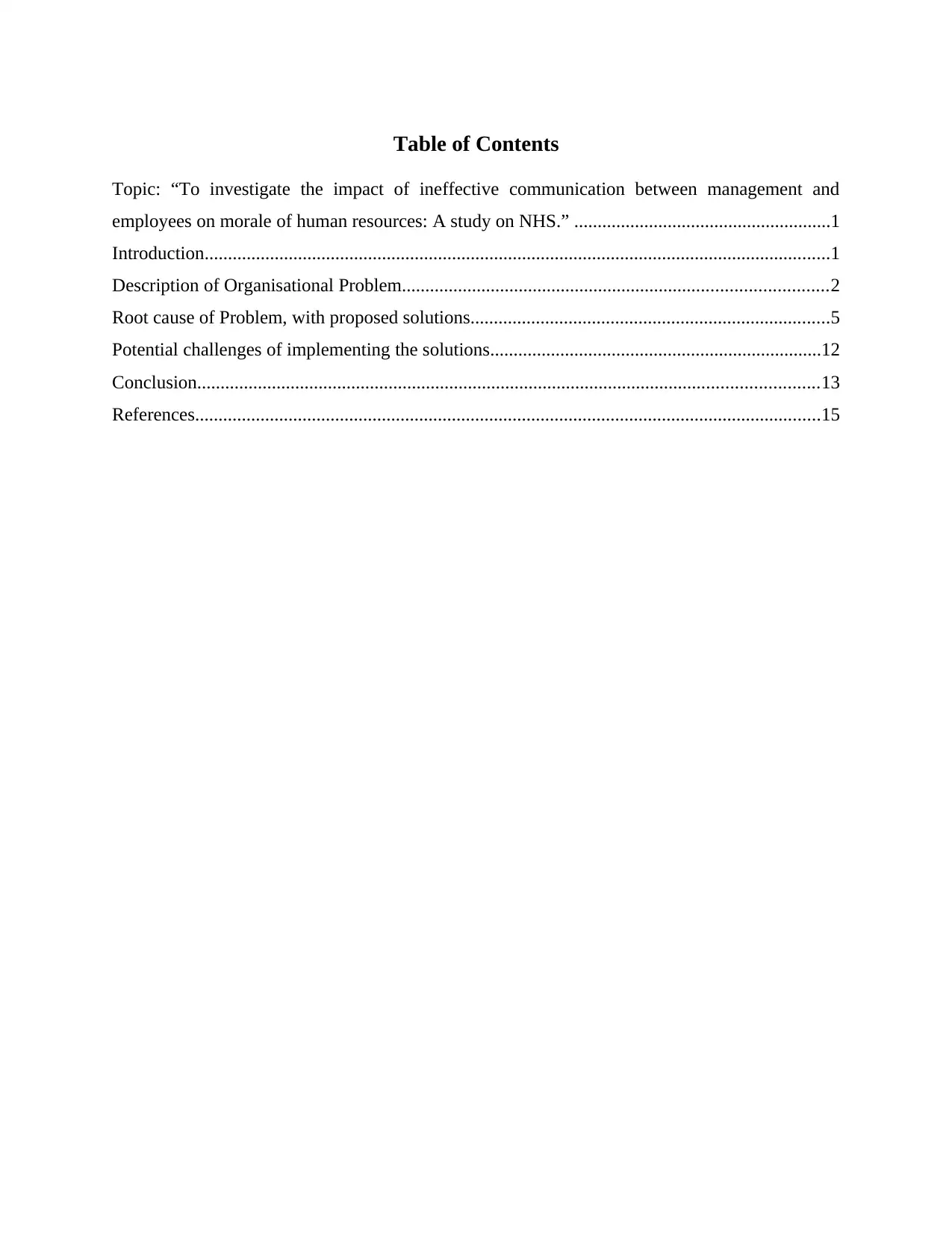
Table of Contents
Topic: “To investigate the impact of ineffective communication between management and
employees on morale of human resources: A study on NHS.” .......................................................1
Introduction......................................................................................................................................1
Description of Organisational Problem...........................................................................................2
Root cause of Problem, with proposed solutions.............................................................................5
Potential challenges of implementing the solutions.......................................................................12
Conclusion.....................................................................................................................................13
References......................................................................................................................................15
Topic: “To investigate the impact of ineffective communication between management and
employees on morale of human resources: A study on NHS.” .......................................................1
Introduction......................................................................................................................................1
Description of Organisational Problem...........................................................................................2
Root cause of Problem, with proposed solutions.............................................................................5
Potential challenges of implementing the solutions.......................................................................12
Conclusion.....................................................................................................................................13
References......................................................................................................................................15
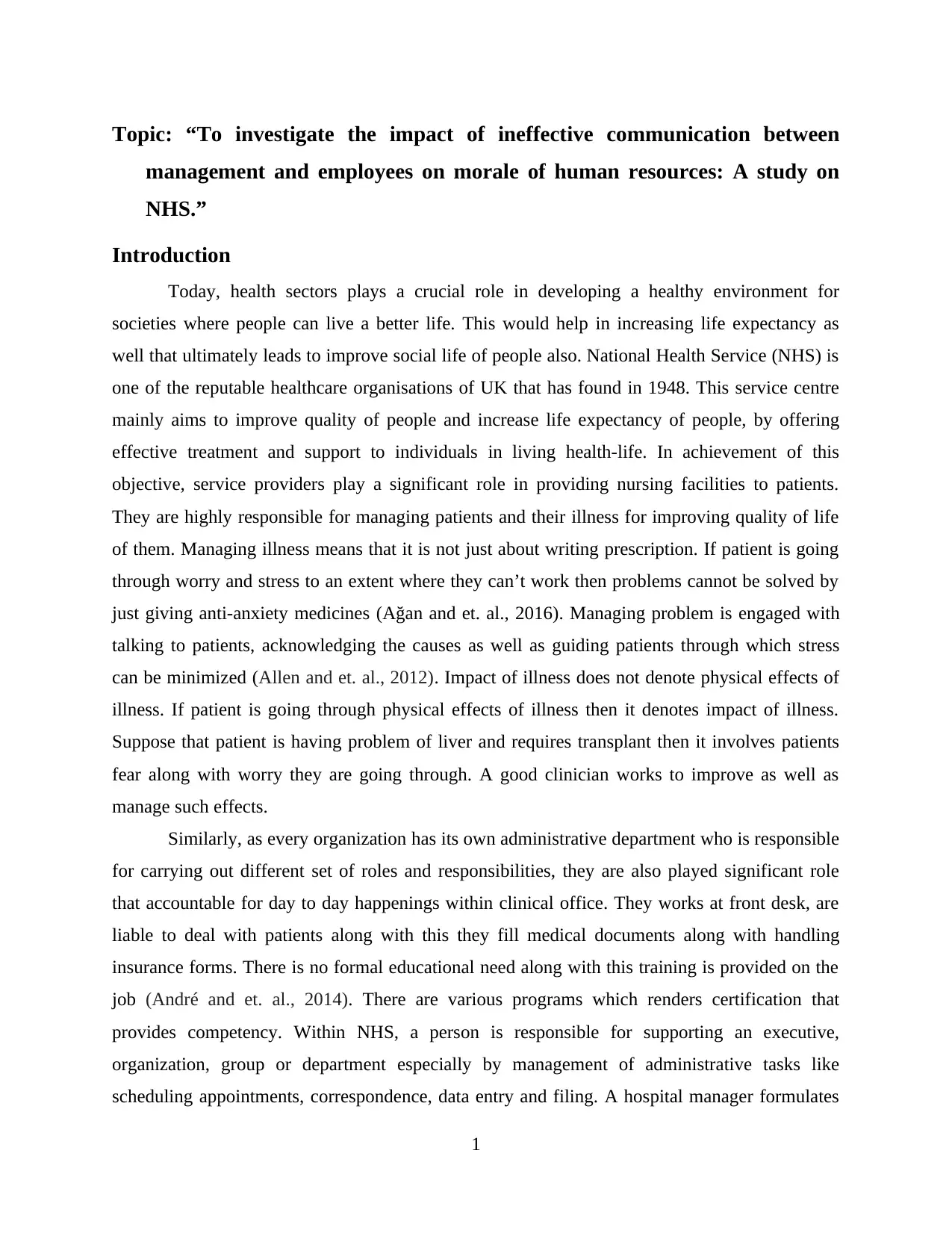
Topic: “To investigate the impact of ineffective communication between
management and employees on morale of human resources: A study on
NHS.”
Introduction
Today, health sectors plays a crucial role in developing a healthy environment for
societies where people can live a better life. This would help in increasing life expectancy as
well that ultimately leads to improve social life of people also. National Health Service (NHS) is
one of the reputable healthcare organisations of UK that has found in 1948. This service centre
mainly aims to improve quality of people and increase life expectancy of people, by offering
effective treatment and support to individuals in living health-life. In achievement of this
objective, service providers play a significant role in providing nursing facilities to patients.
They are highly responsible for managing patients and their illness for improving quality of life
of them. Managing illness means that it is not just about writing prescription. If patient is going
through worry and stress to an extent where they can’t work then problems cannot be solved by
just giving anti-anxiety medicines (Ağan and et. al., 2016). Managing problem is engaged with
talking to patients, acknowledging the causes as well as guiding patients through which stress
can be minimized (Allen and et. al., 2012). Impact of illness does not denote physical effects of
illness. If patient is going through physical effects of illness then it denotes impact of illness.
Suppose that patient is having problem of liver and requires transplant then it involves patients
fear along with worry they are going through. A good clinician works to improve as well as
manage such effects.
Similarly, as every organization has its own administrative department who is responsible
for carrying out different set of roles and responsibilities, they are also played significant role
that accountable for day to day happenings within clinical office. They works at front desk, are
liable to deal with patients along with this they fill medical documents along with handling
insurance forms. There is no formal educational need along with this training is provided on the
job (André and et. al., 2014). There are various programs which renders certification that
provides competency. Within NHS, a person is responsible for supporting an executive,
organization, group or department especially by management of administrative tasks like
scheduling appointments, correspondence, data entry and filing. A hospital manager formulates
1
management and employees on morale of human resources: A study on
NHS.”
Introduction
Today, health sectors plays a crucial role in developing a healthy environment for
societies where people can live a better life. This would help in increasing life expectancy as
well that ultimately leads to improve social life of people also. National Health Service (NHS) is
one of the reputable healthcare organisations of UK that has found in 1948. This service centre
mainly aims to improve quality of people and increase life expectancy of people, by offering
effective treatment and support to individuals in living health-life. In achievement of this
objective, service providers play a significant role in providing nursing facilities to patients.
They are highly responsible for managing patients and their illness for improving quality of life
of them. Managing illness means that it is not just about writing prescription. If patient is going
through worry and stress to an extent where they can’t work then problems cannot be solved by
just giving anti-anxiety medicines (Ağan and et. al., 2016). Managing problem is engaged with
talking to patients, acknowledging the causes as well as guiding patients through which stress
can be minimized (Allen and et. al., 2012). Impact of illness does not denote physical effects of
illness. If patient is going through physical effects of illness then it denotes impact of illness.
Suppose that patient is having problem of liver and requires transplant then it involves patients
fear along with worry they are going through. A good clinician works to improve as well as
manage such effects.
Similarly, as every organization has its own administrative department who is responsible
for carrying out different set of roles and responsibilities, they are also played significant role
that accountable for day to day happenings within clinical office. They works at front desk, are
liable to deal with patients along with this they fill medical documents along with handling
insurance forms. There is no formal educational need along with this training is provided on the
job (André and et. al., 2014). There are various programs which renders certification that
provides competency. Within NHS, a person is responsible for supporting an executive,
organization, group or department especially by management of administrative tasks like
scheduling appointments, correspondence, data entry and filing. A hospital manager formulates
1
⊘ This is a preview!⊘
Do you want full access?
Subscribe today to unlock all pages.

Trusted by 1+ million students worldwide

decision with respect to finance and structure. They evaluate new procedures as well as
efficiency of health care. Hospital managers work along with administrators to plan as well as
coordinate with health services which are provided by organization. They are also responsible for
supervising all areas of hospital which comprises of physicians, nursing, medical records, health
information technicians and many others (Flamholtz, 2012). Clinical managers are also liable to
recruitment & selection, their development, formulation of policies along with implementation of
policies and setting & monitoring budgets as well as make purchase decisions for equipment.
Non-clinical roles are those who are not liable to any kind of medical testing or attention. It
comprises of coders and medical billing, transcriptional, hospital executives, receptionists and
any other individual who works like a support staff within hospital like human resources,
administrative assistants, IT, etc. Thus, collaboration of these staff members help NHS in
providing the best case services to patients.
Description of Organisational Problem
As in providing services to individuals and creating a healthy environment, the main role
in health-care organisations is played by staff members. Therefore, if there will be lack of
communication in between management and employees then, this may directly demoralise the
human resources (Houben and et. al., 2014). Without proper communication, staff members at
health-care organisations feel less-motivated and also contributed less support in delivering
services to patients. So, this may lead to put direct affect the health of patients and create a
number of risk factors for them as well. In this regard, a research is going to conduct to analyse
how ineffective communication put impact on employee engagement and morale of staff
members at health-care organisations. For this purpose, a case analysis is done on National
Health Service by formulating a number of objectives as given beneath:
Aim:
“To investigate the impact of ineffective communication between management and
employees on morale of human resources: A study on NHS.”
Objectives:
To determine how ineffective communication impact on morale of human resources
within health-care organisation. To identify the issues faced by NHS due to ineffective communication between its
management and employees.
2
efficiency of health care. Hospital managers work along with administrators to plan as well as
coordinate with health services which are provided by organization. They are also responsible for
supervising all areas of hospital which comprises of physicians, nursing, medical records, health
information technicians and many others (Flamholtz, 2012). Clinical managers are also liable to
recruitment & selection, their development, formulation of policies along with implementation of
policies and setting & monitoring budgets as well as make purchase decisions for equipment.
Non-clinical roles are those who are not liable to any kind of medical testing or attention. It
comprises of coders and medical billing, transcriptional, hospital executives, receptionists and
any other individual who works like a support staff within hospital like human resources,
administrative assistants, IT, etc. Thus, collaboration of these staff members help NHS in
providing the best case services to patients.
Description of Organisational Problem
As in providing services to individuals and creating a healthy environment, the main role
in health-care organisations is played by staff members. Therefore, if there will be lack of
communication in between management and employees then, this may directly demoralise the
human resources (Houben and et. al., 2014). Without proper communication, staff members at
health-care organisations feel less-motivated and also contributed less support in delivering
services to patients. So, this may lead to put direct affect the health of patients and create a
number of risk factors for them as well. In this regard, a research is going to conduct to analyse
how ineffective communication put impact on employee engagement and morale of staff
members at health-care organisations. For this purpose, a case analysis is done on National
Health Service by formulating a number of objectives as given beneath:
Aim:
“To investigate the impact of ineffective communication between management and
employees on morale of human resources: A study on NHS.”
Objectives:
To determine how ineffective communication impact on morale of human resources
within health-care organisation. To identify the issues faced by NHS due to ineffective communication between its
management and employees.
2
Paraphrase This Document
Need a fresh take? Get an instant paraphrase of this document with our AI Paraphraser
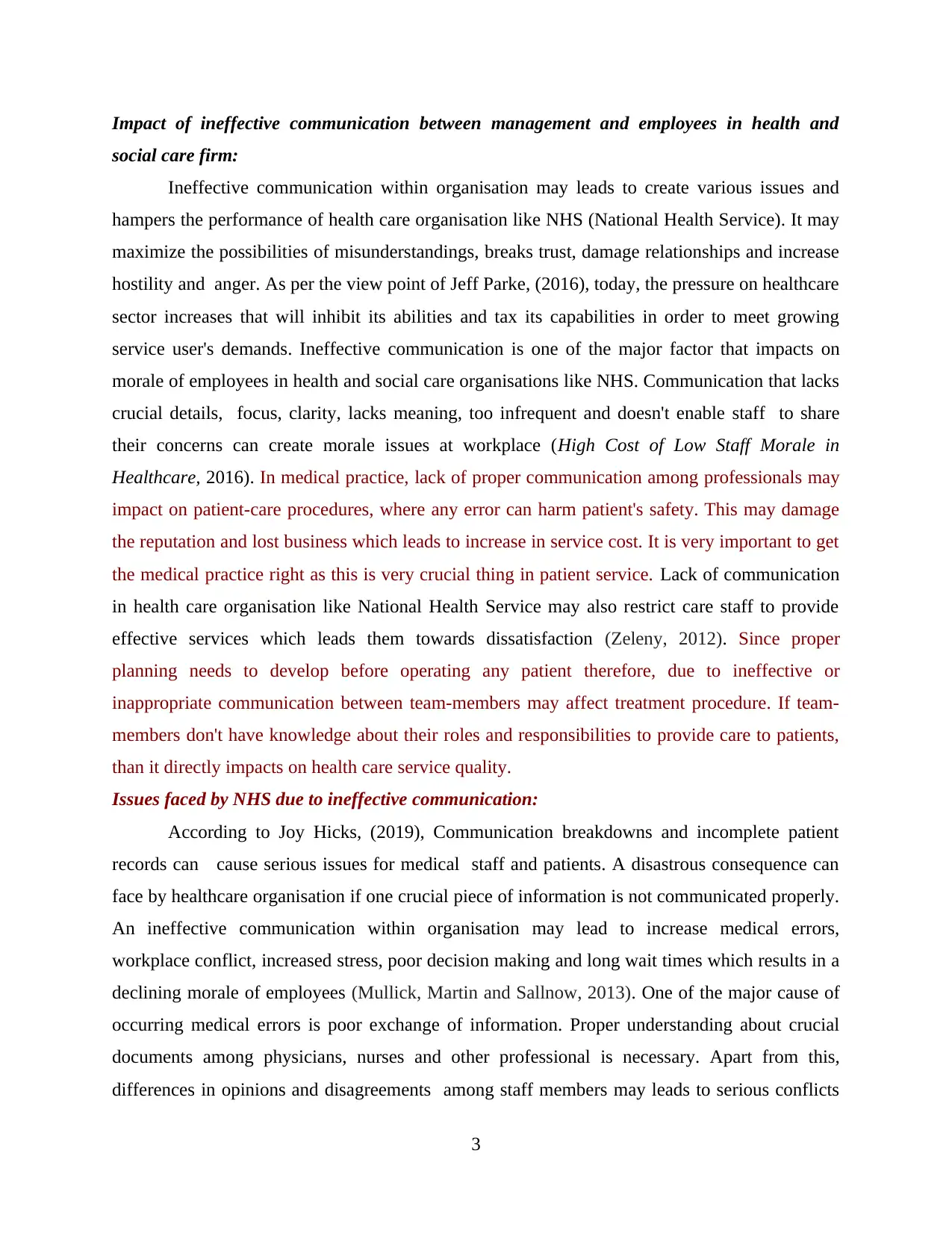
Impact of ineffective communication between management and employees in health and
social care firm:
Ineffective communication within organisation may leads to create various issues and
hampers the performance of health care organisation like NHS (National Health Service). It may
maximize the possibilities of misunderstandings, breaks trust, damage relationships and increase
hostility and anger. As per the view point of Jeff Parke, (2016), today, the pressure on healthcare
sector increases that will inhibit its abilities and tax its capabilities in order to meet growing
service user's demands. Ineffective communication is one of the major factor that impacts on
morale of employees in health and social care organisations like NHS. Communication that lacks
crucial details, focus, clarity, lacks meaning, too infrequent and doesn't enable staff to share
their concerns can create morale issues at workplace (High Cost of Low Staff Morale in
Healthcare, 2016). In medical practice, lack of proper communication among professionals may
impact on patient-care procedures, where any error can harm patient's safety. This may damage
the reputation and lost business which leads to increase in service cost. It is very important to get
the medical practice right as this is very crucial thing in patient service. Lack of communication
in health care organisation like National Health Service may also restrict care staff to provide
effective services which leads them towards dissatisfaction (Zeleny, 2012). Since proper
planning needs to develop before operating any patient therefore, due to ineffective or
inappropriate communication between team-members may affect treatment procedure. If team-
members don't have knowledge about their roles and responsibilities to provide care to patients,
than it directly impacts on health care service quality.
Issues faced by NHS due to ineffective communication:
According to Joy Hicks, (2019), Communication breakdowns and incomplete patient
records can cause serious issues for medical staff and patients. A disastrous consequence can
face by healthcare organisation if one crucial piece of information is not communicated properly.
An ineffective communication within organisation may lead to increase medical errors,
workplace conflict, increased stress, poor decision making and long wait times which results in a
declining morale of employees (Mullick, Martin and Sallnow, 2013). One of the major cause of
occurring medical errors is poor exchange of information. Proper understanding about crucial
documents among physicians, nurses and other professional is necessary. Apart from this,
differences in opinions and disagreements among staff members may leads to serious conflicts
3
social care firm:
Ineffective communication within organisation may leads to create various issues and
hampers the performance of health care organisation like NHS (National Health Service). It may
maximize the possibilities of misunderstandings, breaks trust, damage relationships and increase
hostility and anger. As per the view point of Jeff Parke, (2016), today, the pressure on healthcare
sector increases that will inhibit its abilities and tax its capabilities in order to meet growing
service user's demands. Ineffective communication is one of the major factor that impacts on
morale of employees in health and social care organisations like NHS. Communication that lacks
crucial details, focus, clarity, lacks meaning, too infrequent and doesn't enable staff to share
their concerns can create morale issues at workplace (High Cost of Low Staff Morale in
Healthcare, 2016). In medical practice, lack of proper communication among professionals may
impact on patient-care procedures, where any error can harm patient's safety. This may damage
the reputation and lost business which leads to increase in service cost. It is very important to get
the medical practice right as this is very crucial thing in patient service. Lack of communication
in health care organisation like National Health Service may also restrict care staff to provide
effective services which leads them towards dissatisfaction (Zeleny, 2012). Since proper
planning needs to develop before operating any patient therefore, due to ineffective or
inappropriate communication between team-members may affect treatment procedure. If team-
members don't have knowledge about their roles and responsibilities to provide care to patients,
than it directly impacts on health care service quality.
Issues faced by NHS due to ineffective communication:
According to Joy Hicks, (2019), Communication breakdowns and incomplete patient
records can cause serious issues for medical staff and patients. A disastrous consequence can
face by healthcare organisation if one crucial piece of information is not communicated properly.
An ineffective communication within organisation may lead to increase medical errors,
workplace conflict, increased stress, poor decision making and long wait times which results in a
declining morale of employees (Mullick, Martin and Sallnow, 2013). One of the major cause of
occurring medical errors is poor exchange of information. Proper understanding about crucial
documents among physicians, nurses and other professional is necessary. Apart from this,
differences in opinions and disagreements among staff members may leads to serious conflicts
3
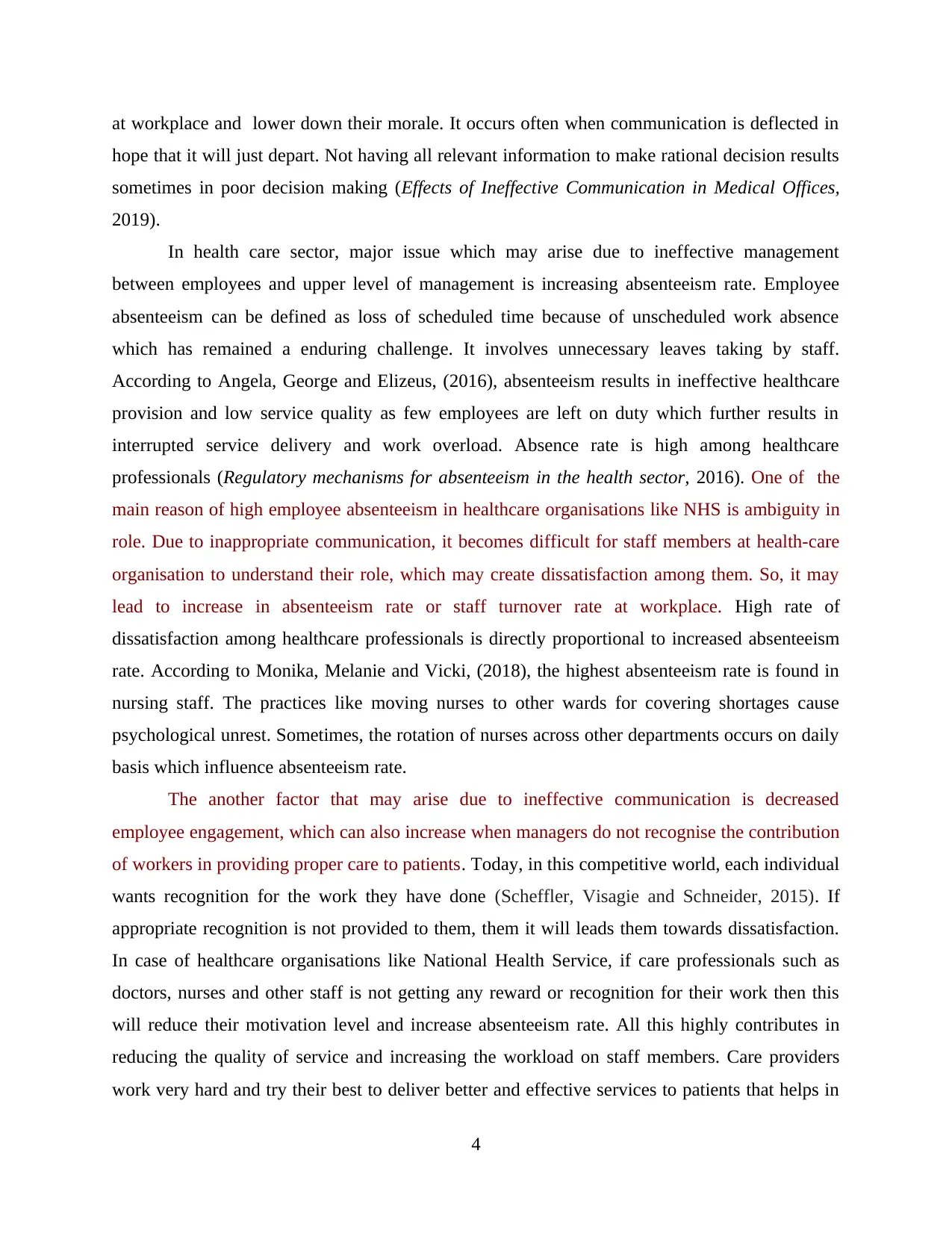
at workplace and lower down their morale. It occurs often when communication is deflected in
hope that it will just depart. Not having all relevant information to make rational decision results
sometimes in poor decision making (Effects of Ineffective Communication in Medical Offices,
2019).
In health care sector, major issue which may arise due to ineffective management
between employees and upper level of management is increasing absenteeism rate. Employee
absenteeism can be defined as loss of scheduled time because of unscheduled work absence
which has remained a enduring challenge. It involves unnecessary leaves taking by staff.
According to Angela, George and Elizeus, (2016), absenteeism results in ineffective healthcare
provision and low service quality as few employees are left on duty which further results in
interrupted service delivery and work overload. Absence rate is high among healthcare
professionals (Regulatory mechanisms for absenteeism in the health sector, 2016). One of the
main reason of high employee absenteeism in healthcare organisations like NHS is ambiguity in
role. Due to inappropriate communication, it becomes difficult for staff members at health-care
organisation to understand their role, which may create dissatisfaction among them. So, it may
lead to increase in absenteeism rate or staff turnover rate at workplace. High rate of
dissatisfaction among healthcare professionals is directly proportional to increased absenteeism
rate. According to Monika, Melanie and Vicki, (2018), the highest absenteeism rate is found in
nursing staff. The practices like moving nurses to other wards for covering shortages cause
psychological unrest. Sometimes, the rotation of nurses across other departments occurs on daily
basis which influence absenteeism rate.
The another factor that may arise due to ineffective communication is decreased
employee engagement, which can also increase when managers do not recognise the contribution
of workers in providing proper care to patients. Today, in this competitive world, each individual
wants recognition for the work they have done (Scheffler, Visagie and Schneider, 2015). If
appropriate recognition is not provided to them, them it will leads them towards dissatisfaction.
In case of healthcare organisations like National Health Service, if care professionals such as
doctors, nurses and other staff is not getting any reward or recognition for their work then this
will reduce their motivation level and increase absenteeism rate. All this highly contributes in
reducing the quality of service and increasing the workload on staff members. Care providers
work very hard and try their best to deliver better and effective services to patients that helps in
4
hope that it will just depart. Not having all relevant information to make rational decision results
sometimes in poor decision making (Effects of Ineffective Communication in Medical Offices,
2019).
In health care sector, major issue which may arise due to ineffective management
between employees and upper level of management is increasing absenteeism rate. Employee
absenteeism can be defined as loss of scheduled time because of unscheduled work absence
which has remained a enduring challenge. It involves unnecessary leaves taking by staff.
According to Angela, George and Elizeus, (2016), absenteeism results in ineffective healthcare
provision and low service quality as few employees are left on duty which further results in
interrupted service delivery and work overload. Absence rate is high among healthcare
professionals (Regulatory mechanisms for absenteeism in the health sector, 2016). One of the
main reason of high employee absenteeism in healthcare organisations like NHS is ambiguity in
role. Due to inappropriate communication, it becomes difficult for staff members at health-care
organisation to understand their role, which may create dissatisfaction among them. So, it may
lead to increase in absenteeism rate or staff turnover rate at workplace. High rate of
dissatisfaction among healthcare professionals is directly proportional to increased absenteeism
rate. According to Monika, Melanie and Vicki, (2018), the highest absenteeism rate is found in
nursing staff. The practices like moving nurses to other wards for covering shortages cause
psychological unrest. Sometimes, the rotation of nurses across other departments occurs on daily
basis which influence absenteeism rate.
The another factor that may arise due to ineffective communication is decreased
employee engagement, which can also increase when managers do not recognise the contribution
of workers in providing proper care to patients. Today, in this competitive world, each individual
wants recognition for the work they have done (Scheffler, Visagie and Schneider, 2015). If
appropriate recognition is not provided to them, them it will leads them towards dissatisfaction.
In case of healthcare organisations like National Health Service, if care professionals such as
doctors, nurses and other staff is not getting any reward or recognition for their work then this
will reduce their motivation level and increase absenteeism rate. All this highly contributes in
reducing the quality of service and increasing the workload on staff members. Care providers
work very hard and try their best to deliver better and effective services to patients that helps in
4
⊘ This is a preview!⊘
Do you want full access?
Subscribe today to unlock all pages.

Trusted by 1+ million students worldwide
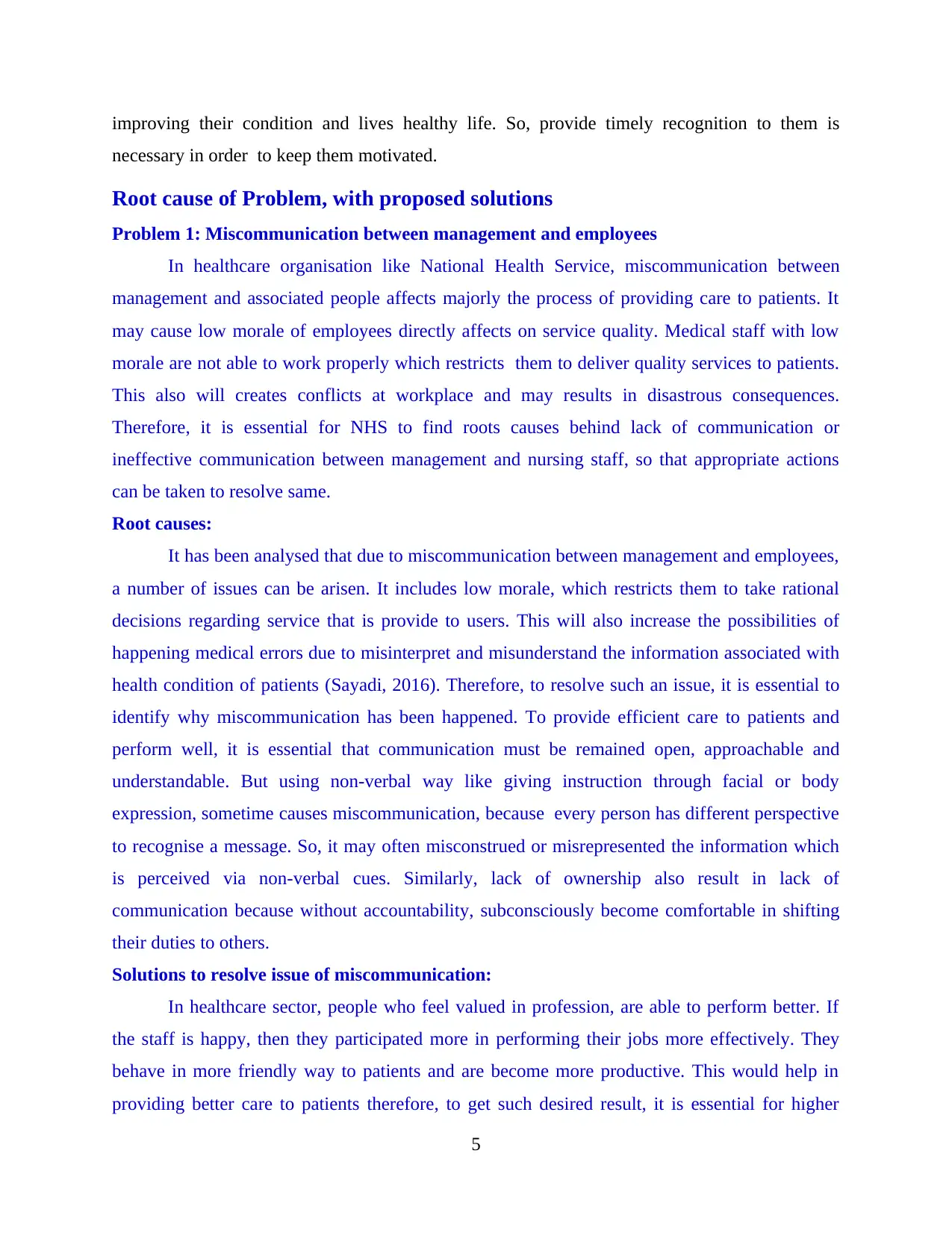
improving their condition and lives healthy life. So, provide timely recognition to them is
necessary in order to keep them motivated.
Root cause of Problem, with proposed solutions
Problem 1: Miscommunication between management and employees
In healthcare organisation like National Health Service, miscommunication between
management and associated people affects majorly the process of providing care to patients. It
may cause low morale of employees directly affects on service quality. Medical staff with low
morale are not able to work properly which restricts them to deliver quality services to patients.
This also will creates conflicts at workplace and may results in disastrous consequences.
Therefore, it is essential for NHS to find roots causes behind lack of communication or
ineffective communication between management and nursing staff, so that appropriate actions
can be taken to resolve same.
Root causes:
It has been analysed that due to miscommunication between management and employees,
a number of issues can be arisen. It includes low morale, which restricts them to take rational
decisions regarding service that is provide to users. This will also increase the possibilities of
happening medical errors due to misinterpret and misunderstand the information associated with
health condition of patients (Sayadi, 2016). Therefore, to resolve such an issue, it is essential to
identify why miscommunication has been happened. To provide efficient care to patients and
perform well, it is essential that communication must be remained open, approachable and
understandable. But using non-verbal way like giving instruction through facial or body
expression, sometime causes miscommunication, because every person has different perspective
to recognise a message. So, it may often misconstrued or misrepresented the information which
is perceived via non-verbal cues. Similarly, lack of ownership also result in lack of
communication because without accountability, subconsciously become comfortable in shifting
their duties to others.
Solutions to resolve issue of miscommunication:
In healthcare sector, people who feel valued in profession, are able to perform better. If
the staff is happy, then they participated more in performing their jobs more effectively. They
behave in more friendly way to patients and are become more productive. This would help in
providing better care to patients therefore, to get such desired result, it is essential for higher
5
necessary in order to keep them motivated.
Root cause of Problem, with proposed solutions
Problem 1: Miscommunication between management and employees
In healthcare organisation like National Health Service, miscommunication between
management and associated people affects majorly the process of providing care to patients. It
may cause low morale of employees directly affects on service quality. Medical staff with low
morale are not able to work properly which restricts them to deliver quality services to patients.
This also will creates conflicts at workplace and may results in disastrous consequences.
Therefore, it is essential for NHS to find roots causes behind lack of communication or
ineffective communication between management and nursing staff, so that appropriate actions
can be taken to resolve same.
Root causes:
It has been analysed that due to miscommunication between management and employees,
a number of issues can be arisen. It includes low morale, which restricts them to take rational
decisions regarding service that is provide to users. This will also increase the possibilities of
happening medical errors due to misinterpret and misunderstand the information associated with
health condition of patients (Sayadi, 2016). Therefore, to resolve such an issue, it is essential to
identify why miscommunication has been happened. To provide efficient care to patients and
perform well, it is essential that communication must be remained open, approachable and
understandable. But using non-verbal way like giving instruction through facial or body
expression, sometime causes miscommunication, because every person has different perspective
to recognise a message. So, it may often misconstrued or misrepresented the information which
is perceived via non-verbal cues. Similarly, lack of ownership also result in lack of
communication because without accountability, subconsciously become comfortable in shifting
their duties to others.
Solutions to resolve issue of miscommunication:
In healthcare sector, people who feel valued in profession, are able to perform better. If
the staff is happy, then they participated more in performing their jobs more effectively. They
behave in more friendly way to patients and are become more productive. This would help in
providing better care to patients therefore, to get such desired result, it is essential for higher
5
Paraphrase This Document
Need a fresh take? Get an instant paraphrase of this document with our AI Paraphraser
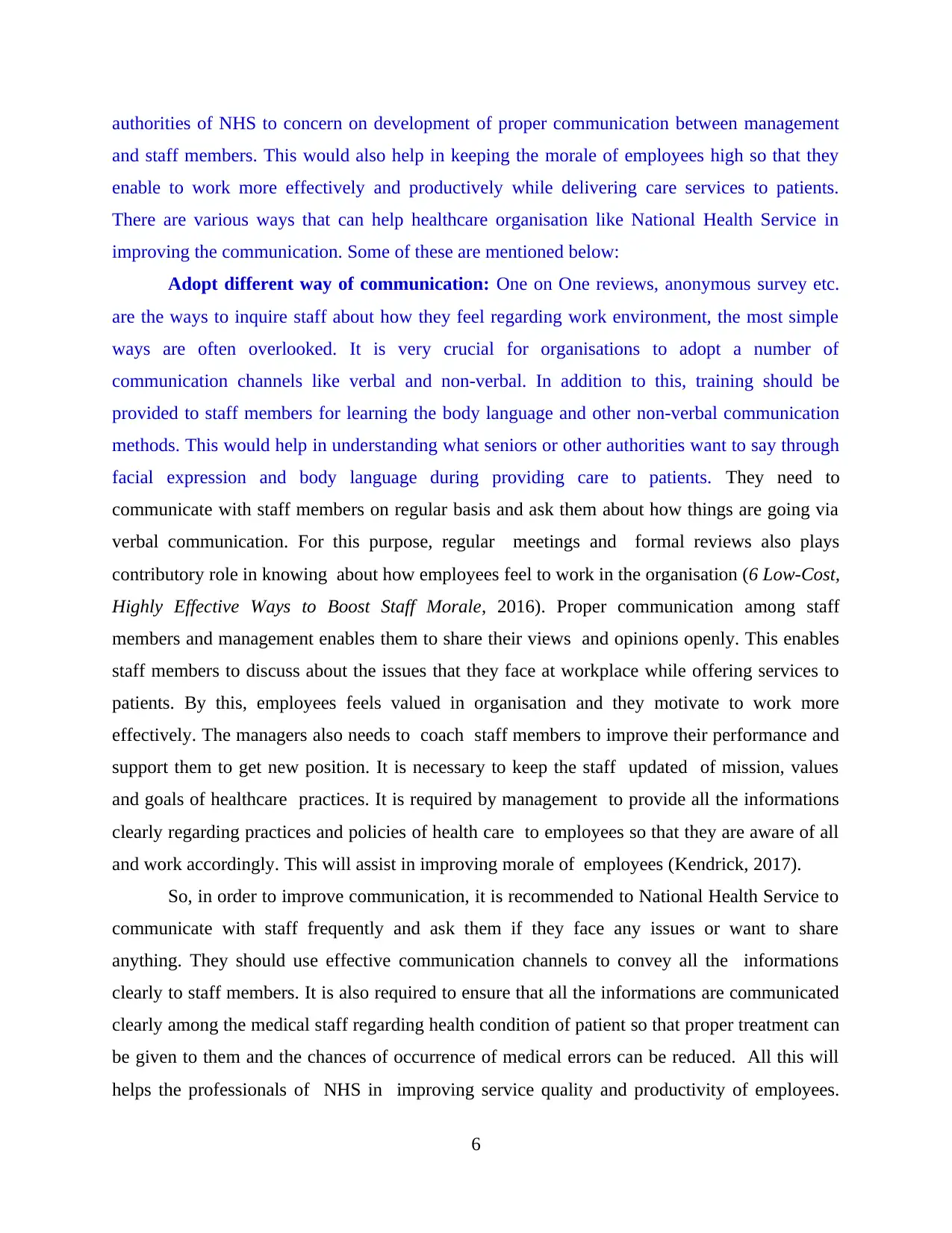
authorities of NHS to concern on development of proper communication between management
and staff members. This would also help in keeping the morale of employees high so that they
enable to work more effectively and productively while delivering care services to patients.
There are various ways that can help healthcare organisation like National Health Service in
improving the communication. Some of these are mentioned below:
Adopt different way of communication: One on One reviews, anonymous survey etc.
are the ways to inquire staff about how they feel regarding work environment, the most simple
ways are often overlooked. It is very crucial for organisations to adopt a number of
communication channels like verbal and non-verbal. In addition to this, training should be
provided to staff members for learning the body language and other non-verbal communication
methods. This would help in understanding what seniors or other authorities want to say through
facial expression and body language during providing care to patients. They need to
communicate with staff members on regular basis and ask them about how things are going via
verbal communication. For this purpose, regular meetings and formal reviews also plays
contributory role in knowing about how employees feel to work in the organisation (6 Low-Cost,
Highly Effective Ways to Boost Staff Morale, 2016). Proper communication among staff
members and management enables them to share their views and opinions openly. This enables
staff members to discuss about the issues that they face at workplace while offering services to
patients. By this, employees feels valued in organisation and they motivate to work more
effectively. The managers also needs to coach staff members to improve their performance and
support them to get new position. It is necessary to keep the staff updated of mission, values
and goals of healthcare practices. It is required by management to provide all the informations
clearly regarding practices and policies of health care to employees so that they are aware of all
and work accordingly. This will assist in improving morale of employees (Kendrick, 2017).
So, in order to improve communication, it is recommended to National Health Service to
communicate with staff frequently and ask them if they face any issues or want to share
anything. They should use effective communication channels to convey all the informations
clearly to staff members. It is also required to ensure that all the informations are communicated
clearly among the medical staff regarding health condition of patient so that proper treatment can
be given to them and the chances of occurrence of medical errors can be reduced. All this will
helps the professionals of NHS in improving service quality and productivity of employees.
6
and staff members. This would also help in keeping the morale of employees high so that they
enable to work more effectively and productively while delivering care services to patients.
There are various ways that can help healthcare organisation like National Health Service in
improving the communication. Some of these are mentioned below:
Adopt different way of communication: One on One reviews, anonymous survey etc.
are the ways to inquire staff about how they feel regarding work environment, the most simple
ways are often overlooked. It is very crucial for organisations to adopt a number of
communication channels like verbal and non-verbal. In addition to this, training should be
provided to staff members for learning the body language and other non-verbal communication
methods. This would help in understanding what seniors or other authorities want to say through
facial expression and body language during providing care to patients. They need to
communicate with staff members on regular basis and ask them about how things are going via
verbal communication. For this purpose, regular meetings and formal reviews also plays
contributory role in knowing about how employees feel to work in the organisation (6 Low-Cost,
Highly Effective Ways to Boost Staff Morale, 2016). Proper communication among staff
members and management enables them to share their views and opinions openly. This enables
staff members to discuss about the issues that they face at workplace while offering services to
patients. By this, employees feels valued in organisation and they motivate to work more
effectively. The managers also needs to coach staff members to improve their performance and
support them to get new position. It is necessary to keep the staff updated of mission, values
and goals of healthcare practices. It is required by management to provide all the informations
clearly regarding practices and policies of health care to employees so that they are aware of all
and work accordingly. This will assist in improving morale of employees (Kendrick, 2017).
So, in order to improve communication, it is recommended to National Health Service to
communicate with staff frequently and ask them if they face any issues or want to share
anything. They should use effective communication channels to convey all the informations
clearly to staff members. It is also required to ensure that all the informations are communicated
clearly among the medical staff regarding health condition of patient so that proper treatment can
be given to them and the chances of occurrence of medical errors can be reduced. All this will
helps the professionals of NHS in improving service quality and productivity of employees.
6

Management should ensure that the problems of employees are resolved properly so that they
feel happy at workplace and their morale level can improve (Mullick, Martin and Sallnow,
2013).
Reward and recognition for performance: For improving communication between
management and staff members, authorities of NHS also need to recognise the performance of
each. This would help in getting more involvement of staff with management to learn medical
practice. They require to know that their presence is appreciated and their contributions are
valued. The morale of employees will slump if they feels that their work is not recognised. The
attention and praise from managers improves motivation level of employees. Practices that
makes the staff feel that a they are part of organisation helps in a giving better results in terms of
employee loyalty, morale and productivity. So, in order to enhance performance of employees, it
is recommended to manager of NHS to provide reward and recognition to staff members for
their best performance as this will assist in improving morale and motivation level of
employees. By this, they feels sense of belongingness with organisation and their satisfaction
level is also increase. The ways in which NHS can reward and recognise its staff members are:
Organisation can set up a monthly program to provide recognition to employee for their
work (Ways to improve employee morale, 2019).
It can provide small gifts to employees like trinkets or cards when an individual goes
beyond and above the call duty.
They can celebrate their anniversaries and birthdays by decorate their cubicle and bring a
bigger cake for them.
Organisation can create bulletin board which is dedicated to staff accomplishments.
It can also provide staff with a some monetary benefit for their performance.
Above mentioned are all the ways that helps management of National Health Service in
improving morale of staff members and satisfy them. This will also assist in increasing their
participation in job roles and a healthy workplace environment keep maintain where employees
can share their views and opinions to others.
Offering variety of scheduling methods for staff: There are variety of scheduling
methods that can offer by health care organisations to staff members while still meeting demand
of patient. Mobile technology, open shift management and self scheduling are the ways through
which organisation can improve the way shifts are assigned to employees and enable then to
7
feel happy at workplace and their morale level can improve (Mullick, Martin and Sallnow,
2013).
Reward and recognition for performance: For improving communication between
management and staff members, authorities of NHS also need to recognise the performance of
each. This would help in getting more involvement of staff with management to learn medical
practice. They require to know that their presence is appreciated and their contributions are
valued. The morale of employees will slump if they feels that their work is not recognised. The
attention and praise from managers improves motivation level of employees. Practices that
makes the staff feel that a they are part of organisation helps in a giving better results in terms of
employee loyalty, morale and productivity. So, in order to enhance performance of employees, it
is recommended to manager of NHS to provide reward and recognition to staff members for
their best performance as this will assist in improving morale and motivation level of
employees. By this, they feels sense of belongingness with organisation and their satisfaction
level is also increase. The ways in which NHS can reward and recognise its staff members are:
Organisation can set up a monthly program to provide recognition to employee for their
work (Ways to improve employee morale, 2019).
It can provide small gifts to employees like trinkets or cards when an individual goes
beyond and above the call duty.
They can celebrate their anniversaries and birthdays by decorate their cubicle and bring a
bigger cake for them.
Organisation can create bulletin board which is dedicated to staff accomplishments.
It can also provide staff with a some monetary benefit for their performance.
Above mentioned are all the ways that helps management of National Health Service in
improving morale of staff members and satisfy them. This will also assist in increasing their
participation in job roles and a healthy workplace environment keep maintain where employees
can share their views and opinions to others.
Offering variety of scheduling methods for staff: There are variety of scheduling
methods that can offer by health care organisations to staff members while still meeting demand
of patient. Mobile technology, open shift management and self scheduling are the ways through
which organisation can improve the way shifts are assigned to employees and enable then to
7
⊘ This is a preview!⊘
Do you want full access?
Subscribe today to unlock all pages.

Trusted by 1+ million students worldwide
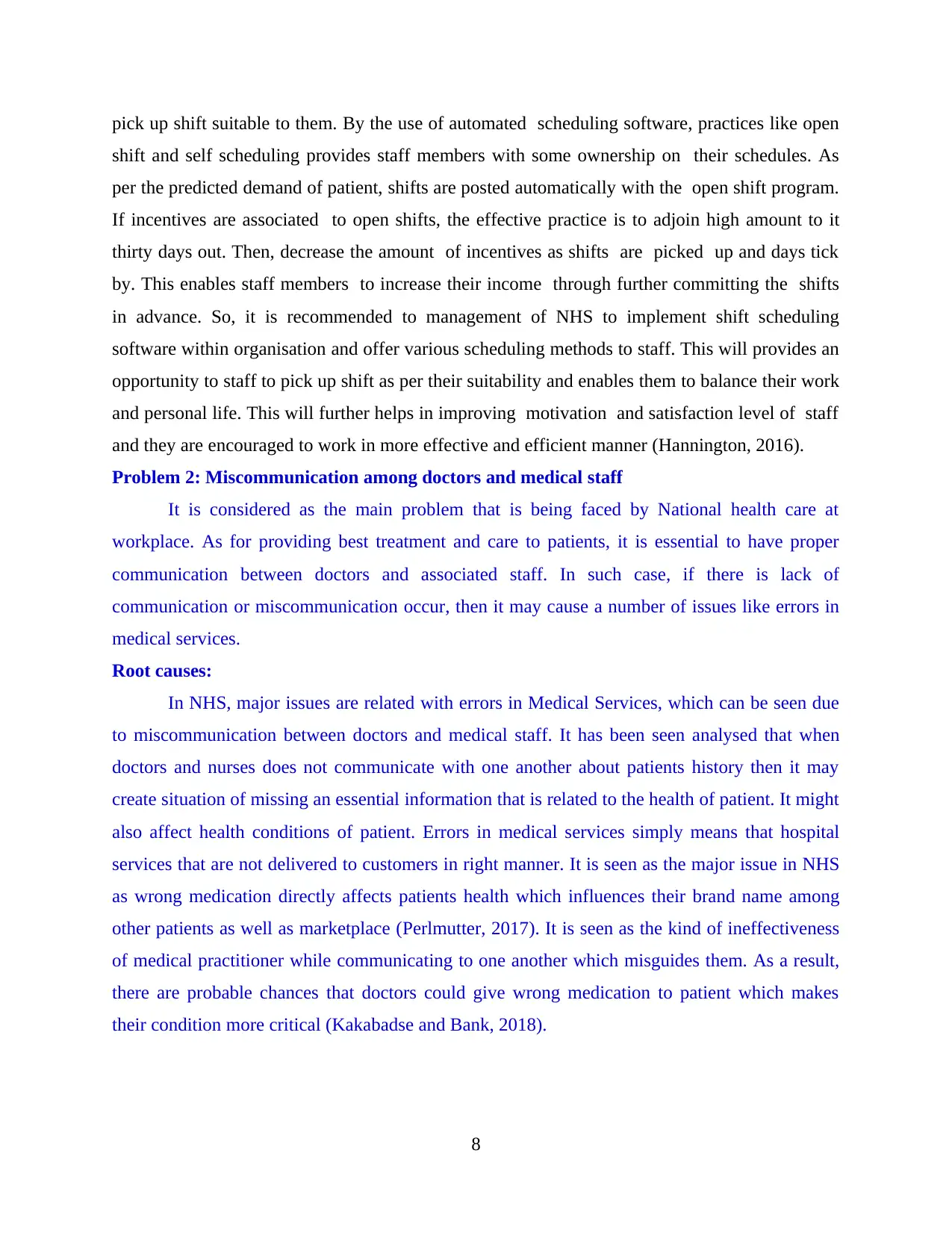
pick up shift suitable to them. By the use of automated scheduling software, practices like open
shift and self scheduling provides staff members with some ownership on their schedules. As
per the predicted demand of patient, shifts are posted automatically with the open shift program.
If incentives are associated to open shifts, the effective practice is to adjoin high amount to it
thirty days out. Then, decrease the amount of incentives as shifts are picked up and days tick
by. This enables staff members to increase their income through further committing the shifts
in advance. So, it is recommended to management of NHS to implement shift scheduling
software within organisation and offer various scheduling methods to staff. This will provides an
opportunity to staff to pick up shift as per their suitability and enables them to balance their work
and personal life. This will further helps in improving motivation and satisfaction level of staff
and they are encouraged to work in more effective and efficient manner (Hannington, 2016).
Problem 2: Miscommunication among doctors and medical staff
It is considered as the main problem that is being faced by National health care at
workplace. As for providing best treatment and care to patients, it is essential to have proper
communication between doctors and associated staff. In such case, if there is lack of
communication or miscommunication occur, then it may cause a number of issues like errors in
medical services.
Root causes:
In NHS, major issues are related with errors in Medical Services, which can be seen due
to miscommunication between doctors and medical staff. It has been seen analysed that when
doctors and nurses does not communicate with one another about patients history then it may
create situation of missing an essential information that is related to the health of patient. It might
also affect health conditions of patient. Errors in medical services simply means that hospital
services that are not delivered to customers in right manner. It is seen as the major issue in NHS
as wrong medication directly affects patients health which influences their brand name among
other patients as well as marketplace (Perlmutter, 2017). It is seen as the kind of ineffectiveness
of medical practitioner while communicating to one another which misguides them. As a result,
there are probable chances that doctors could give wrong medication to patient which makes
their condition more critical (Kakabadse and Bank, 2018).
8
shift and self scheduling provides staff members with some ownership on their schedules. As
per the predicted demand of patient, shifts are posted automatically with the open shift program.
If incentives are associated to open shifts, the effective practice is to adjoin high amount to it
thirty days out. Then, decrease the amount of incentives as shifts are picked up and days tick
by. This enables staff members to increase their income through further committing the shifts
in advance. So, it is recommended to management of NHS to implement shift scheduling
software within organisation and offer various scheduling methods to staff. This will provides an
opportunity to staff to pick up shift as per their suitability and enables them to balance their work
and personal life. This will further helps in improving motivation and satisfaction level of staff
and they are encouraged to work in more effective and efficient manner (Hannington, 2016).
Problem 2: Miscommunication among doctors and medical staff
It is considered as the main problem that is being faced by National health care at
workplace. As for providing best treatment and care to patients, it is essential to have proper
communication between doctors and associated staff. In such case, if there is lack of
communication or miscommunication occur, then it may cause a number of issues like errors in
medical services.
Root causes:
In NHS, major issues are related with errors in Medical Services, which can be seen due
to miscommunication between doctors and medical staff. It has been seen analysed that when
doctors and nurses does not communicate with one another about patients history then it may
create situation of missing an essential information that is related to the health of patient. It might
also affect health conditions of patient. Errors in medical services simply means that hospital
services that are not delivered to customers in right manner. It is seen as the major issue in NHS
as wrong medication directly affects patients health which influences their brand name among
other patients as well as marketplace (Perlmutter, 2017). It is seen as the kind of ineffectiveness
of medical practitioner while communicating to one another which misguides them. As a result,
there are probable chances that doctors could give wrong medication to patient which makes
their condition more critical (Kakabadse and Bank, 2018).
8
Paraphrase This Document
Need a fresh take? Get an instant paraphrase of this document with our AI Paraphraser
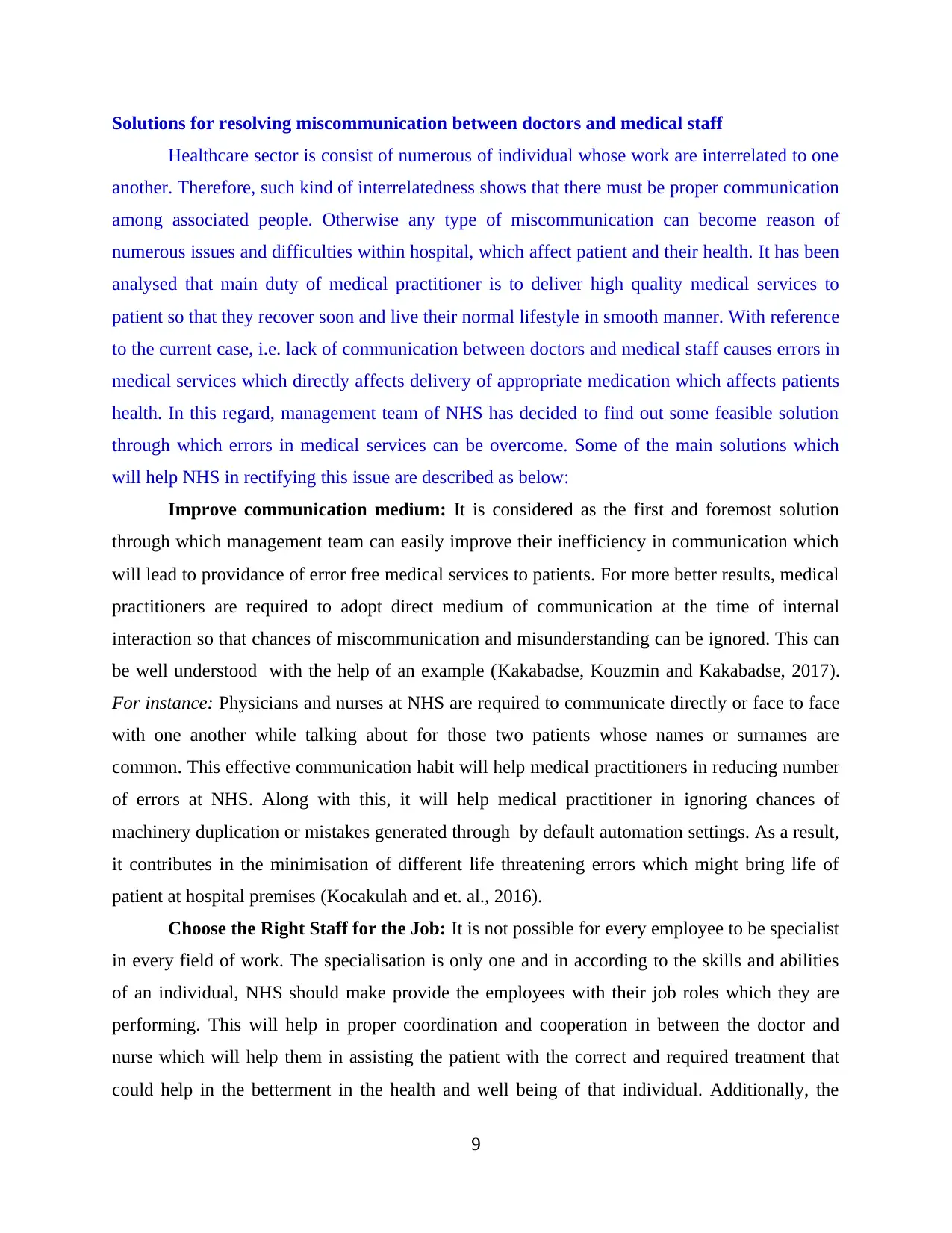
Solutions for resolving miscommunication between doctors and medical staff
Healthcare sector is consist of numerous of individual whose work are interrelated to one
another. Therefore, such kind of interrelatedness shows that there must be proper communication
among associated people. Otherwise any type of miscommunication can become reason of
numerous issues and difficulties within hospital, which affect patient and their health. It has been
analysed that main duty of medical practitioner is to deliver high quality medical services to
patient so that they recover soon and live their normal lifestyle in smooth manner. With reference
to the current case, i.e. lack of communication between doctors and medical staff causes errors in
medical services which directly affects delivery of appropriate medication which affects patients
health. In this regard, management team of NHS has decided to find out some feasible solution
through which errors in medical services can be overcome. Some of the main solutions which
will help NHS in rectifying this issue are described as below:
Improve communication medium: It is considered as the first and foremost solution
through which management team can easily improve their inefficiency in communication which
will lead to providance of error free medical services to patients. For more better results, medical
practitioners are required to adopt direct medium of communication at the time of internal
interaction so that chances of miscommunication and misunderstanding can be ignored. This can
be well understood with the help of an example (Kakabadse, Kouzmin and Kakabadse, 2017).
For instance: Physicians and nurses at NHS are required to communicate directly or face to face
with one another while talking about for those two patients whose names or surnames are
common. This effective communication habit will help medical practitioners in reducing number
of errors at NHS. Along with this, it will help medical practitioner in ignoring chances of
machinery duplication or mistakes generated through by default automation settings. As a result,
it contributes in the minimisation of different life threatening errors which might bring life of
patient at hospital premises (Kocakulah and et. al., 2016).
Choose the Right Staff for the Job: It is not possible for every employee to be specialist
in every field of work. The specialisation is only one and in according to the skills and abilities
of an individual, NHS should make provide the employees with their job roles which they are
performing. This will help in proper coordination and cooperation in between the doctor and
nurse which will help them in assisting the patient with the correct and required treatment that
could help in the betterment in the health and well being of that individual. Additionally, the
9
Healthcare sector is consist of numerous of individual whose work are interrelated to one
another. Therefore, such kind of interrelatedness shows that there must be proper communication
among associated people. Otherwise any type of miscommunication can become reason of
numerous issues and difficulties within hospital, which affect patient and their health. It has been
analysed that main duty of medical practitioner is to deliver high quality medical services to
patient so that they recover soon and live their normal lifestyle in smooth manner. With reference
to the current case, i.e. lack of communication between doctors and medical staff causes errors in
medical services which directly affects delivery of appropriate medication which affects patients
health. In this regard, management team of NHS has decided to find out some feasible solution
through which errors in medical services can be overcome. Some of the main solutions which
will help NHS in rectifying this issue are described as below:
Improve communication medium: It is considered as the first and foremost solution
through which management team can easily improve their inefficiency in communication which
will lead to providance of error free medical services to patients. For more better results, medical
practitioners are required to adopt direct medium of communication at the time of internal
interaction so that chances of miscommunication and misunderstanding can be ignored. This can
be well understood with the help of an example (Kakabadse, Kouzmin and Kakabadse, 2017).
For instance: Physicians and nurses at NHS are required to communicate directly or face to face
with one another while talking about for those two patients whose names or surnames are
common. This effective communication habit will help medical practitioners in reducing number
of errors at NHS. Along with this, it will help medical practitioner in ignoring chances of
machinery duplication or mistakes generated through by default automation settings. As a result,
it contributes in the minimisation of different life threatening errors which might bring life of
patient at hospital premises (Kocakulah and et. al., 2016).
Choose the Right Staff for the Job: It is not possible for every employee to be specialist
in every field of work. The specialisation is only one and in according to the skills and abilities
of an individual, NHS should make provide the employees with their job roles which they are
performing. This will help in proper coordination and cooperation in between the doctor and
nurse which will help them in assisting the patient with the correct and required treatment that
could help in the betterment in the health and well being of that individual. Additionally, the
9

employees should also be provided with training and development programs which will help
them in increasing their skills and efficiencies as well as will also contribute in enhancing their
personal and professional development. With the help of these programs, the medical
practitioners will be able to provide the patients with right treatment at the needed time. These
programs will also help the health care practitioners to identify the real and potential medical
errors which are occurring in the working of NHS and will be able to identify and eradicate them
from the processes of NHS. In this way, the medical errors caused due to miscommunication in
an organisation such as NHS can be eliminated from the working processes (Reiche, Harzing and
Pudelko, 2017).
Engage patients and family : Training the patients is necessary step that need to
followed by the health management which will aid to safeguard the staff as well as helps to
improve positive environment in the clinic. NHS which is well reputed hospital which can aid to
improve the environment, hence the engaging the family by making them satisfy about the safety
in hospital. For every problem there is solution that should adopted by the staff team of the clinic
there for more development it is necessary that hospital staff should encourage and support the
patient families so that networking can be increased and error can be avoided. So the company
can work in effective way hence hospital atmosphere should be neat and clean and for the patient
family proper bed facility should be provided so that they can feel comfortable and staff
involvement that make the healthy environment through these activity hospital will gain
goodwill and will gain growth in health sector. More over service sector main aim is to provide
the best service to customer (Serenko and Bontis, 2016).
Hence medical error can be resolved and it is common in the health care and which aid to
producing a better health result. System perceptive of health care is need to be modified and
should be step first to avoid errors (Petrick, 2017).
Provide adequate safety training : Another important step is face by the people in the
hospital is unsafely situation which staff need to know given power act. The safety issues that
need be maintained by the staff to grow the service sector in effective manner. Hence some of
the practises which need to implemented by the management in effective way. Due less
managing power the company need to improve these policies for the effective growth (Lewin,
2018). The Hospitality sector should make certain laws and rules which help to develop the
service sector in proper manner. Hospitality service sector that need to provide proper securities
10
them in increasing their skills and efficiencies as well as will also contribute in enhancing their
personal and professional development. With the help of these programs, the medical
practitioners will be able to provide the patients with right treatment at the needed time. These
programs will also help the health care practitioners to identify the real and potential medical
errors which are occurring in the working of NHS and will be able to identify and eradicate them
from the processes of NHS. In this way, the medical errors caused due to miscommunication in
an organisation such as NHS can be eliminated from the working processes (Reiche, Harzing and
Pudelko, 2017).
Engage patients and family : Training the patients is necessary step that need to
followed by the health management which will aid to safeguard the staff as well as helps to
improve positive environment in the clinic. NHS which is well reputed hospital which can aid to
improve the environment, hence the engaging the family by making them satisfy about the safety
in hospital. For every problem there is solution that should adopted by the staff team of the clinic
there for more development it is necessary that hospital staff should encourage and support the
patient families so that networking can be increased and error can be avoided. So the company
can work in effective way hence hospital atmosphere should be neat and clean and for the patient
family proper bed facility should be provided so that they can feel comfortable and staff
involvement that make the healthy environment through these activity hospital will gain
goodwill and will gain growth in health sector. More over service sector main aim is to provide
the best service to customer (Serenko and Bontis, 2016).
Hence medical error can be resolved and it is common in the health care and which aid to
producing a better health result. System perceptive of health care is need to be modified and
should be step first to avoid errors (Petrick, 2017).
Provide adequate safety training : Another important step is face by the people in the
hospital is unsafely situation which staff need to know given power act. The safety issues that
need be maintained by the staff to grow the service sector in effective manner. Hence some of
the practises which need to implemented by the management in effective way. Due less
managing power the company need to improve these policies for the effective growth (Lewin,
2018). The Hospitality sector should make certain laws and rules which help to develop the
service sector in proper manner. Hospitality service sector that need to provide proper securities
10
⊘ This is a preview!⊘
Do you want full access?
Subscribe today to unlock all pages.

Trusted by 1+ million students worldwide
1 out of 20
Related Documents
Your All-in-One AI-Powered Toolkit for Academic Success.
+13062052269
info@desklib.com
Available 24*7 on WhatsApp / Email
![[object Object]](/_next/static/media/star-bottom.7253800d.svg)
Unlock your academic potential
Copyright © 2020–2026 A2Z Services. All Rights Reserved. Developed and managed by ZUCOL.





